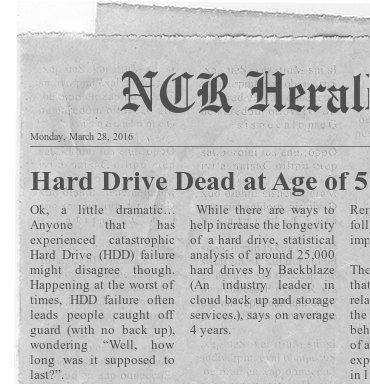
Anyone that has experienced catastrophic Hard Drive (HDD) failure might understand the uncomfortable feeling of not being able to use their computer, and not knowing whether or not their data is safe. Seemingly happening at the worst of times, HDD failure often leaves people caught off guard (with no back up), wondering “Well, how long was it supposed to last?”.
While there are ways to help increase the longevity of a hard drive, statistical analysis of around 25,000 hard drives by Backblaze (An industry leader in cloud back up and storage services) says, on average, 4 years. Realistically, no other major industry studies have been done with consumer hard drives, and the information from Backblaze only includes certain makes and models of hard drives which are a small portion of what is available on the market (including newer technologies which have been improved on the last 2 years since the study).
Be On The Lookout!
Short of a defective drive failing right out of the box, we sometimes have to play detective to more accurately predict when a hard drive will fail. There are certain things to look for that might better prepare us for an impending failure, giving us a window of time to recover any data we might want to save. If your system is slowing to a snail’s pace during routine activity or crashing under minimal loads, especially if the OS has been freshly installed, this could be an indicator of a failing hard drive.
Another sign your drive could be on its way out is if files and applications are failing to load. Sometimes most easily identifiable, is a mechanical failure as this will most of the time cause strange sounds to come from your computer.
Some detective work is taken off of our shoulders with most modern PCs now. Most current PCs have a feature called S.M.A.R.T. (Self-Monitoring Analysis and Reporting Technology). While not 100% reliable at catching an upcoming catastrophe, if detected, the system will typically halt during boot up and inform you things aren’t looking good. (Note from our lead technician: Internal analysis of service tickets actually indicate that S.M.A.R.T. monitoring is notoriously bad at detecting actually hard drive issues as out of a total yearly average of about 40-50 hard drive failures or operational issues requiring a new HDD, we only had 2 where it was noted that the SMART monitoring detected a failure beforehand. Statistics here are in no way scientific, simply anecdotal)
Don’t Get Caught Off Guard!
From the moment you first start using a hard drive, it is an inevitability that it will fail. While this average of 4 years gives us a great baseline to predict a future failure, there are too many variables to say for sure your hard drive won’t last longer than this, or even die the first day out of the box. It is best to assume your hard drive could go at any time, and take preventative measures against the potential headache that could come from being caught off guard.
While we have had great success in saving client data from a failing drive, drives that have already failed can prove quite difficult and sometimes only salvageable by deep data recovery specialists. Services like these depending on the man hours that go into them can prove to be a costly process. Our recommendation if you're stuck with a badly damaged drive is to check out Gillware Data Recovery for a free instant estimate. they'll even send you a free shipping label and do a full drive analysis to see what can be recovered and give you a full report and firm estimate BEFORE you agree to pay for the service! It doesn't get much more low-risk than that.
The best way to not be caught off guard is to have a backup in place. Modern operating systems come with a user friendly way to back up to an external Hard drive or USB flash drive (procedure is the same, though a USB drive may need to be formatted specially in order to use as a backup drive).
We made a handy guide for the DIY users right here. Alternatively a cloud based backup solution, such as Carbonite, is in my opinion the best way to go for two reasons: You'll never have to worry about losing the sacred backup drive you've spent so much time keeping up-to-date, and you'll literally be able to entirely forget about backing up your computer since it will be done automatically for you within minutes of changing/creating a file.
Feel free to click the link below and see how easy it is with a free 2-week trial.
Leave us a comment below if you have a problem with a drive you can't seem to figure out, we'll do our best to help!


